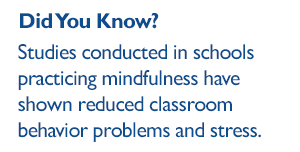Children who experience traumatic experiences are known to have long-term negative health effects, including mental, behavioral and physical issues. Mindfulness interventions have proven successful in adults and those dealing with trauma to negate some of the effects of distress. It is suggested that mindfulness could be utilized in children with adverse childhood experiences to also curb negative health effects.
Adverse Childhood Experiences
There are many categories of adverse childhood experiences (ACEs) which a child may experience personally, or observe through a loved one. These include, but are not limited to: neglect, abuse (physical, emotional, sexual), violence, mental illness, incarceration, drug problems and low socioeconomic status. Prolonged stress can be psychologically and physically problematic, and can manifest as increased inflammation, neurological changes, and dysfunction of the endocrine system. ACEs are common: A CDC study found 69 percent of those examined in five states reported at least one incidence. ACEs tend to occur together, and more ACEs decrease overall health and well-being. ACEs have also been linked to an increased risk for migraines, insomnia, some cancers, learning and behavior problems, and suicide, as well as predispositions to behaviors leading to obesity or smoking.
Mindfulness and Traumatic Experiences
In a recent review by Robin Ortiz and Erica Sibinga of The Johns Hopkins Hospital, the authors determined that mindfulness intervention could prevent the negative side effects of ACEs. Mindfulness is found to be beneficial by redirecting the negative response to trauma as well as destressing the individual to hinder long-term effects of trauma. Mindfulness has proven a successful coping mechanism in women survivors of sexual abuse, incarcerated women, veterans with PTSD, and the general population by increasing resiliency. The practice has been shown to reduce inflammation, alter immunity, and decrease biological aging.
Practicing Mindfulness
Derived from Buddhist tradition, mindfulness is the practice of being fully aware of the present moment in a non-judgmental manner. Mindfulness can be intentionally practiced in structured training programs. Outside of structured practice, mindfulness can be achieved through art therapy, yoga, group therapy, and other focuses on mind and body. Practicing mindfulness has been shown to increase resiliency. Resilience lies in the ability to effectively cope with a traumatic experience. After many traumatic experiences, the survivor may try to dissociate from the trauma, which prevents helpful processing of the event. Mindfulness brings attention and awareness to the traumatic event, which can help with coping and increase resilience.
Utilizing Mindfulness for ACEs
Employing mindfulness techniques in everyday life can help survivors of traumatic experiences, as well as benefit the general public to reduce stress. Focusing on introducing mindfulness into your busy day, or encouraging others who are struggling to bring awareness, can help everyone to negate the long-term negative side effects of stress.
References
Related Content
- Their DNA Will Remember: The Long-Term Effects of Childhood Detention
- Johns Hopkins Faculty Members Give Mindfulness Training a Try
- In Johns Hopkins research, meditation appeared to provide relief from anxiety and depression symptoms
- Community Health Curriculum Instills Positivity in Baltimore Youth


Pingback: The Johns Hopkins Mood Disorders Center hosted an afternoon symposium about mood disorders and mental health, featuring expert speakers from Hopkins and abroad.
Comments are closed.